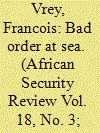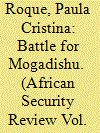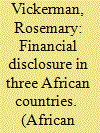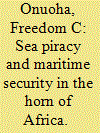|
|
|
Sort Order |
|
|
|
Items / Page
|
|
|
|
|
|
|
| Srl | Item |
| 1 |
ID:
097685


|
|
|
|
|
| Publication |
2009.
|
| Summary/Abstract |
Piracy at sea not only features prominently in the current news media, but has also
come to depict much of what analysts and decision-makers view as bad order at sea.
Although piracy represents only one threat to good order at sea, it appears to be misused
as a general term for a spectrum of maritime threats and vulnerabilities. It should be
noted, however, that bad order at sea stems from more than piracy, which occurs along
both the African east and west coasts. Closer scrutiny shows that piracy against the
shipping trade accounts for much of the threat-vulnerability interface off the coast of
Somalia. To the west, in the Gulf of Guinea, the situation is more complex and the
threat-vulnerability continuum more extended and politicised, although the salience of
piracy is lower. Nonetheless, developments in the Gulf of Guinea portray more progress
on arrangements and activities to prevent bad order at sea.
|
|
|
|
|
|
|
|
|
|
|
|
|
|
|
|
| 2 |
ID:
097696


|
|
|
|
|
| Publication |
2009.
|
| Summary/Abstract |
The period January-July 2009 has witnessed the descent of Somalia from a promising
state of political accommodation and the success of the Djibouti peace process in January
to a state of politico-military anarchy that was highlighted by the Al Shabaab and Hizbul
Islam surge for Mogadishu in May 2009.
|
|
|
|
|
|
|
|
|
|
|
|
|
|
|
|
| 3 |
ID:
097691


|
|
|
|
|
| Publication |
2009.
|
| Summary/Abstract |
Africa has many maritime interests, including trade and the use of its marine resources,
which it can use to support development on the continent. Unfortunately, these
resources are illegally plundered by others (illegal, unreported and unregulated fishing
is an example) and free trade is hampered by phenomena such as piracy and organised
crime. This is to the disadvantage of the people of the African continent. At the same time, little is being done in Africa to protect these interests and resources. The Common
African Defence and Security Policy pays little attention to the maritime dimensions in
addressing threats to peace, security and development. The African Standby Force, as an
instrument for the implementation of the policy, also does not address maritime forces
or the contribution they could make to African security and development. Africa needs
to become more maritime conscious and consider maritime matters at a continental and
sub-regional level and not only as national issues.
|
|
|
|
|
|
|
|
|
|
|
|
|
|
|
|
| 4 |
ID:
097698


|
|
|
|
|
| Publication |
2009.
|
| Summary/Abstract |
Many countries use financial disclosure to manage conflicts of interest. This article
examines disclosure in three African countries: Cameroon, Ghana and South Africa.
These countries fall on a continuum that sees South Africa as the relative success
story, Ghana as occupying the middle position, and Cameroon as failing thus far.
Disclosure regulations detailing who discloses, how often this occurs and what and
when sanctions are to be taken for breaching regulations are presented in brief. Three
key recommendations are made in relation to the legislation and the implementation
thereof. First, it is suggested that in South Africa and Ghana the process of instituting
sanctions be streamlined and, second, that those tasked with keeping the registers of
financial interests are provided with the necessary investigatory powers. Finally, it is
recommended that Ghana and Cameroon practise annual disclosure.
|
|
|
|
|
|
|
|
|
|
|
|
|
|
|
|
| 5 |
ID:
097700


|
|
|
|
|
| Publication |
2009.
|
| Summary/Abstract |
The proliferation of civil militia groups across Africa poses one of the greatest security
tests not only to African nations, but to the greater international community. Given
that international criminal law is constantly evolving in response to new and ever more
complicated issues, it is important to evaluate the role that this can play in addressing
the challenge of civil militia groups. In the case of Kenya, the dual concerns of the rising
strength of civil militia groups and a crumbling police and judicial system continue to
undermine the ability of the nation to secure lasting peace and thus development. There
is a palpable tension between the need to bring civil militias to book over their crimes
and the need to respect national judicial sovereignty, particularly in a state that is viewed
as failing rather than failed. To gain a better understanding of these legal challenges, it
is necessary to develop a framework to assess which crimes committed by civil militia
could potentially fall under the mandate of the International Criminal Court. This
article makes suggestions for a rudimentary basis for such a framework, and discusses
the challenge that civil militias pose to national and international judicial organs.
Finally, it evaluates the value that prosecution of such groups could add to the national
judicial tradition. It argues that the potential benefits of a prosecution far outweigh the
risks, and that a complementarity regime offers opportunities for cooperation between
international criminal law organisations such as the International Criminal Court and
the national judicial system of Kenya.
|
|
|
|
|
|
|
|
|
|
|
|
|
|
|
|
| 6 |
ID:
097684


|
|
|
|
|
| Publication |
2009.
|
| Summary/Abstract |
Until the recent attacks off the coast of Somalia, maritime piracy in general - and in
Africa in particular - has received scant scholarly attention. While this gap is being
remedied with increased study of the current increase in attacks, most of it has focused
on the problem from the point of view of the nations whose vessels are targeted
(whether merchant vessels should be armed, the role of the international community
in combating piracy, etc). What has received little attention to date is the profound
social, economic and political costs pirates can impose on the people of their own countries. This article presents a study of the impact maritime piracy has had on the
peoples of Nigeria, Somalia, and Kenya and Tanzania, with a particular emphasis on its
humanitarian implications.
|
|
|
|
|
|
|
|
|
|
|
|
|
|
|
|
| 7 |
ID:
097694


|
|
|
|
|
| Publication |
2009.
|
| Summary/Abstract |
Ships and those who sail in them face many potential dangers, both from the natural
perils of the sea and from the results of human conduct, which demand a precautionary
response from seafaring nations. The promotion of maritime security in Africa depends
on an international legal framework that provides both opportunities and constraints.
Traditional principles of the law of the sea are not always appropriate to current needs,
but they have been supplemented by more specific measures dealing with maritime
search and rescue, weapons proliferation, piracy and terrorism against ships. Although
good laws are a necessary pre-condition for the achievement of maritime security, they
will only be effective if there is also the political will and the practical capacity among
states to implement them. While much remains to be done, recent developments in
Africa provide some positive grounds for encouragement.
|
|
|
|
|
|
|
|
|
|
|
|
|
|
|
|
| 8 |
ID:
097688


|
|
|
|
|
| Publication |
2009.
|
| Summary/Abstract |
Regrettably, Africa's waters now represent one of the world's most dangerous waterways
for vessels and their crew members in terms of pirate attacks. In the last few years the
Somali coast and the Gulf of Aden in the Horn of Africa have emerged as Africa's - and
by extension the world's - most dangerous waters. This article examines the dimension
that maritime piracy has assumed in the region, identifies the factors contributing to
the upsurge of piracy in the area, and gives an overview of the responses to the growing
piracy in the region. It concludes with suggestions on how to effectively and sustainably
combat the scourge of piracy.
|
|
|
|
|
|
|
|
|
|
|
|
|
|
|
|
| 9 |
ID:
097702


|
|
|
|
|
| Publication |
2009.
|
| Summary/Abstract |
This article takes an in-depth look at the Niger Delta crisis from two divergent but
mutually reinforcing security conceptions, namely national versus people security. It
contends that while the Nigerian government views security from the traditional statecentric
viewpoint and accordingly acts to 'secure' the region, the people view security
from a broader human-centric perspective, and thus responds negatively to state
securitisation/militarisation. This clash of security perspectives sets the stage for and
perpetuates armed conflict in the region as the net result of both sides' insistence on
'securing' their interests, resulting in a situation of mutual antagonism as they bring
to bear their often considerable coercive capacities. Therefore, the broad question the
paper grapples with is whose security is paramount, and against what threats is it aimed.
It reaffirms the need for a paradigm shift in the focus on security by the Nigerian
state from a state-centric perspective that views the people's agitation/resistance as
'terrorism', to a human-centric perspective that will justify its Lockean essence. This is
essential, because the federal government's militarisation of the region fans the flames of
ethnic-nationalism, exacerbating violence and perpetuating criminality with attendant
destabilising consequences for Nigeria's economy and statehood.
|
|
|
|
|
|
|
|
|
|
|
|
|
|
|
|
|
|
|
|
|